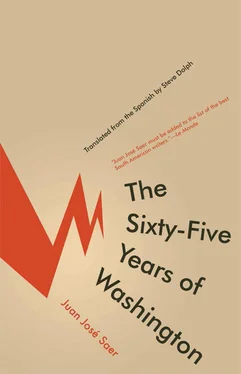Juan José Saer - The Sixty-Five Years of Washington
Здесь есть возможность читать онлайн «Juan José Saer - The Sixty-Five Years of Washington» весь текст электронной книги совершенно бесплатно (целиком полную версию без сокращений). В некоторых случаях можно слушать аудио, скачать через торрент в формате fb2 и присутствует краткое содержание. Год выпуска: 2010, Издательство: Open Letter, Жанр: Современная проза, на английском языке. Описание произведения, (предисловие) а так же отзывы посетителей доступны на портале библиотеки ЛибКат.
- Название:The Sixty-Five Years of Washington
- Автор:
- Издательство:Open Letter
- Жанр:
- Год:2010
- ISBN:нет данных
- Рейтинг книги:3 / 5. Голосов: 1
-
Избранное:Добавить в избранное
- Отзывы:
-
Ваша оценка:
- 60
- 1
- 2
- 3
- 4
- 5
The Sixty-Five Years of Washington: краткое содержание, описание и аннотация
Предлагаем к чтению аннотацию, описание, краткое содержание или предисловие (зависит от того, что написал сам автор книги «The Sixty-Five Years of Washington»). Если вы не нашли необходимую информацию о книге — напишите в комментариях, мы постараемся отыскать её.
The Sixty-Five Years of Washington — читать онлайн бесплатно полную книгу (весь текст) целиком
Ниже представлен текст книги, разбитый по страницам. Система сохранения места последней прочитанной страницы, позволяет с удобством читать онлайн бесплатно книгу «The Sixty-Five Years of Washington», без необходимости каждый раз заново искать на чём Вы остановились. Поставьте закладку, и сможете в любой момент перейти на страницу, на которой закончили чтение.
Интервал:
Закладка:
Absorbed, as we’re in the habit of saying, by his thoughts or, if you prefer, as always, by his memories, Leto steps away from the tree, walking slowly toward the intersection. He has just forgotten about the Mathematician. Like the stage actor who does a pirouette and then disappears into the darkness off stage or, better yet, like those sea creatures who, ignorant of the sun that makes them flash, reveal, periodically, a glistening spine that sinks and reappears at regular intervals, a few images, sharp and well-formed, approach and move off. Distracted, he crosses the street and arrives at the opposite sidewalk — and his distraction is also what makes him go through with the paradoxical act of stopping on the bright sidewalk and turning back toward the corner he has just left, knowing unconsciously that he is waiting for someone or something, but not knowing exactly who or what, or better yet, and strictly speaking, his body is what turns and stops to wait — Leto’s body, no? — that unique and completely external thing that, independent from what, inside, yields control and continuity, now casts, over the gray pavement, a shadow slightly shorter than him — his body, I mean — plump and young, standing in the morning, on the central avenue, giving the world the illusion, or the abusive proof, maybe, of his existence.
In a hurry, the Mathematician walks out of the newspaper office. Seeing him, Leto, for a fraction of a second, thinks, What a coincidence, the Mathematician , until he remembers that they have been walking together for several blocks and that he’s been waiting for him on the sidewalk for a few minutes now. The Mathematician walks straight to the middle of the sidewalk and, noticing Leto’s absence, stops suddenly, disconcerted, but, turning his head, spots him across the street and, resuming a normal stride and smiling apologetically, starts walking toward Leto, who also smiles. And the Mathematician thinks: Did he decide to leave? Maybe he crossed the street to put some distance between us and now he’s smiling back guiltily . The editor had sat reading the press release on his desk without touching it, as though it were a venomous snake. They probably have me blacklisted , the Mathematician thinks. But, like a magician who makes several plates at once dance at the edge of a table, his thoughts are occupied at the same time with Leto, and the Mathematician, to show his good will and that the delay wasn’t his fault, hurries a little without managing to get very far, as the traffic on the two-lane cross street is stopped on the corner because of the movement on the central avenue, forcing him to wait a moment at the cable guardrail, smiling at Leto over the cars that are slowly advancing.
From the opposite sidewalk Leto returns his smile with a vague gesture: on the one hand he wants to show that he accepts the Mathematician’s forgiving smile, which discharges his responsibility and in any case is already disappearing from the Mathematician’s face, but also he doesn’t want to exaggerate the display, in order to highlight that, after all, the Mathematician was the one who whistled on the street and who insists on following him on his walk. But the signals his expression sends in the Mathematician’s direction are neutralized and his expression is incomprehensible, or at least it doesn’t seem to have any effect on the Mathematician’s. Leto looks at him: the Mathematician has finally managed to step over the cable into the street, but a car, brushing past, stops him, and when he moves around it the car stops at the corner, but when he gets to the middle of the street another car coming from the opposite direction forces him, again, to stop; the car that paused on the corner starts up again and, just then, the Mathematician’s entire body, dressed completely in white, including his moccasins, emerges, as if through the opening made by the panels of an accordion door, from between the trunks of the two cars, the same model but different colors, which are separating in opposite directions. He is present, clearly visible. For some reason he ignores, and that he, of course, is not conscious of, Leto’s thoughts and memories are interrupted, and he sees the street, the trees, the newspaper building, the cars, the Mathematician, the sky, the air, and the morning as a clear and animate unity from which he is slightly separated but completely present to, in any case at a fixed and necessary point in space, or in time, or matter, a fluid or nameless, but no doubt optimal, location, where all contradictions, without his having asked or even wanted it, are, benevolently, erased. It’s a novel and pleasant state, but its novelty doesn’t reside in the appearance of something that didn’t exist previously but in a build-up of evidence in the preexistent, and the pleasure, likewise, doesn’t reside in a gratified desire but in some unknown source. It’s hard to say whether the clarity comes from Leto or from the objects, but suddenly, seeing the Mathematician advance upright and white from between the trunks of two cars that are moving in opposite directions, Leto begins to see the group, the Mathematician included, not as cars or trees or houses or sky or human beings, but as a system of relations whose function is no doubt connected to the combination of disparate movements, the Mathematician forward, the cars each a different way, the motionless things changing aspect and location in relation to the moving things, everything no doubt in perfect and causal proportion so that living it or feeling it or however you’d call his state, but without thinking it, Leto experiences a sudden, blunt joy, in which he can’t distinguish the joy from what follows, which sharpens his perception. The car driving away behind the Mathematician is white and the one in front of him, driving in the opposite direction, a pale green — a rare pale green, with shades of gray, as though some white and black had combined in its composition, no? — and the Mathematician, who is emerging from between them, contrasts against the background of trees forming a luminous half-light, over the sidewalk, on the block they just left. What is happening is at the same time fast and very slow. Independent of his physical features, of his dress, even of his social origin or the posture he assumes, nor owing to some affective projection of Leto’s, who shares Tomatis’s objections and knows him less, the Mathematician, as he crosses the street, is transformed into a beautiful object, with an abstract and absolute beauty that has nothing to do with his preexisting attributes but rather with some cosmic coincidence that joins, for a few seconds, many different elements into an unstable composition which, mysteriously, when the Mathematician reaches the sidewalk and the two cars separate in opposite directions, dissolves, having existed only for Leto.
— They wanted to cut it, says, to apologize for the delay, the Mathematician.
Again he’s the Mathematician, a friend of Tomatis, tall, blonde, tan, rich, progressive, dressed completely in white, including his moccasins, carrying a pipe in his hand, just back from a tour of Europe. Leto looks at him quizzically.
— The press release, says the Mathematician.
— Oh, I see. That’s a relief, says Leto, laughing, but the distracted seriousness of the Mathematician, who doesn’t seem to have heard him, causes him to put on a grave expression. They start walking. Out of the corner of his eye, somewhat awkwardly, Leto observes the Mathematician, who has retaken the inside track. For several meters they walk without speaking. Leto thinks that the Mathematician, offended at having seen that he’d crossed the street and was ready to leave if he took any longer at the newspaper, has shut himself off deliberately to show his disapproval; but what is really happening, what gives him that serious, almost irritated air, is that, burrowing into his information, into his suspicions, into his capacity for psychological projection and the political classification of his associates, putting the pieces together, the Mathematician is all but convinced that the newspaper employee, having catalogued him politically as well, has tried to set up obstacles to the publication of the press release and has even suggested that they might end up cutting it. And Leto thinks, or rather sees , no? Lopecito’s face the night of the wake: He never complained. Nothing ever bothered him. He slept three or four hours a night. He never got tired. He never got sick. He always had great ideas. I never saw him depressed. He always had friends. Not once did he doubt his ability. He always had his sights on the future, always wanted to learn new things . Lopecito’s image is erased. Leto turns slightly toward the Mathematician and is about to tell him something but, shaking his head, as though recovering from a faint, the Mathematician speaks first: No , he says, smiling. I was thinking about those cheap sluts the masses refer to as journalists .
Читать дальшеИнтервал:
Закладка:
Похожие книги на «The Sixty-Five Years of Washington»
Представляем Вашему вниманию похожие книги на «The Sixty-Five Years of Washington» списком для выбора. Мы отобрали схожую по названию и смыслу литературу в надежде предоставить читателям больше вариантов отыскать новые, интересные, ещё непрочитанные произведения.
Обсуждение, отзывы о книге «The Sixty-Five Years of Washington» и просто собственные мнения читателей. Оставьте ваши комментарии, напишите, что Вы думаете о произведении, его смысле или главных героях. Укажите что конкретно понравилось, а что нет, и почему Вы так считаете.












